I imagine the minimum wage has been subject to heated debate since New Zealand introduced the concept back in 1894.
Since then, some 90% of countries have established one.
And this month, its effects and how those get measured became a Nobel Prize-winning issue.
A ‘Revolution’ for Economics Research
Three U.S.-based economists have just won the 2021 Nobel Prize in Economics.
David Card takes home half of the million-dollar cash prize. The Berkeley professor analyzed the effects of minimum wage, immigration and education on the labor market.
Card’s friends Joshua Angrist and Guido Imbens, professors at MIT and Stanford, respectively, split the rest of the prize. Their work will help economists draw conclusions about cause and effect in the labor market from natural experiments.
Their collective research “totally revolutionized the way we do empirical work,” according to the Stockholm-based Royal Academy of Sciences.
- There are two key takeaways from their work.
In short, Card concluded that raising the minimum wage has fewer negative effects than many believe. And Angrist and Imbens showed that it’s possible to collect data outside of the strict scientific method.
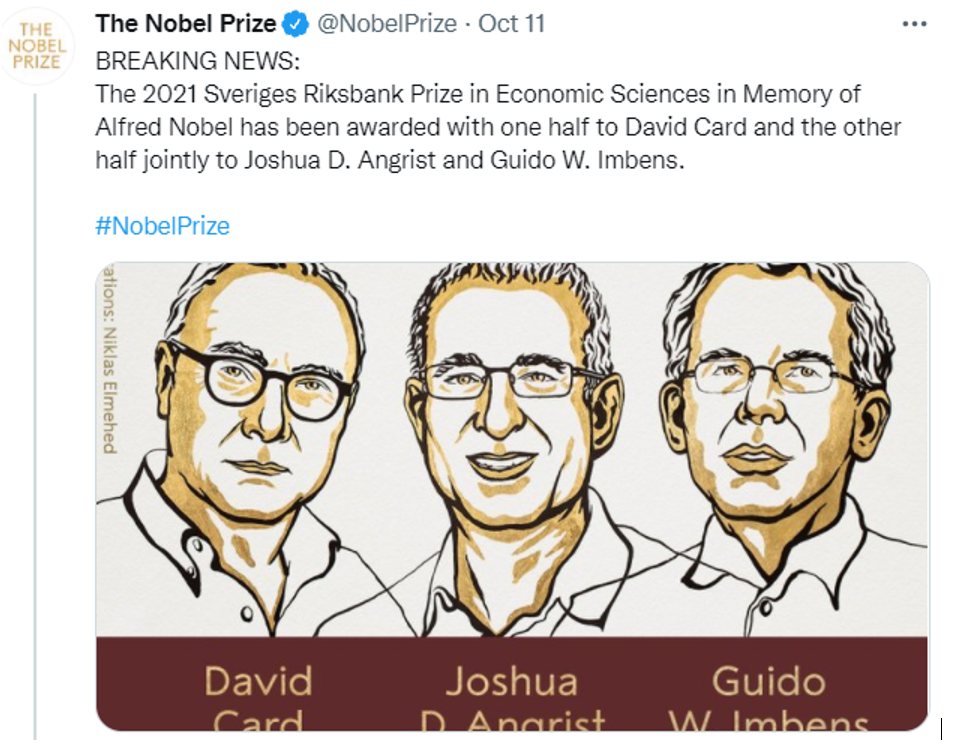 |
| Source: Twitter |
(If you read some of the comments under that Twitter post, you’ll see that Angrist reportedly moonlighted as an Uber driver so he could collect stories from his passengers.)
I don’t think anyone would argue about the benefits of having a minimum wage. The debate is about whether — and by how much — to raise it.
At least, that was a debate in the U.S. until recently …
How Much Is Too Much?
Some 70 years before Uber was founded in 2009, President Franklin Delano Roosevelt created the minimum wage. That was part of 1938’s “Fair Labor Standards Act.”
The intended purpose was to create a “change from starvation wages and starvation employment to living wages and sustained employment.”
For the first time, the federal government established the principle that people are entitled to at least a minimum amount of pay.
Here’s a bit of trivia: That original minimum wage was 25 cents per hour. The original proposal was for 40 cents an hour, but it was scaled back to win the support of southern states.
Since 1938, minimum wage has been raised 22 times by 12 different presidents.
However, the current minimum wage has been unchanged at $7.25 since 2009.
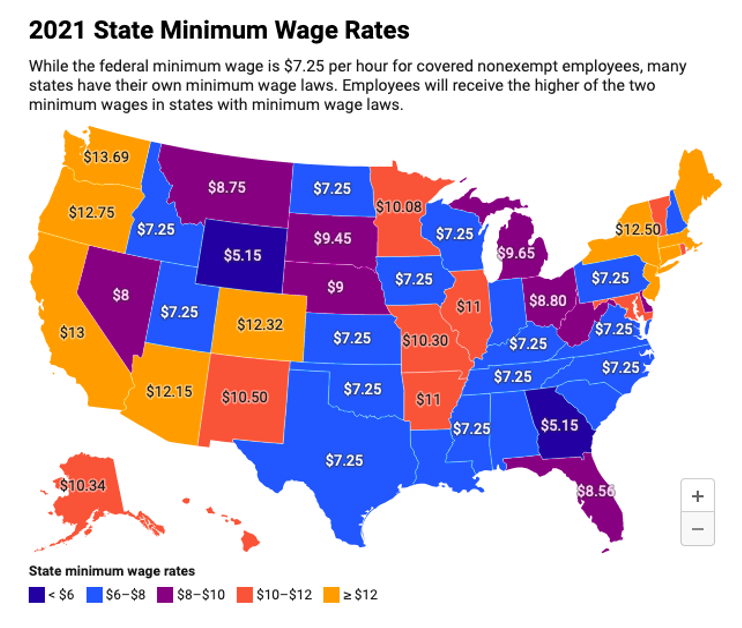 |
| Source: Opportunity Financial |
But you haven’t heard much blabber-mouthing about upping the minimum wage lately.
A Big Boo$t, but Little Interest
In April, President Biden issued an executive order requiring all federal contractors to pay a $15 minimum wage. Many states — like California, New York, New Jersey, Colorado and Washington — already require a minimum wage of more than $12 an hour.
The need for new minimum wage legislation has been rendered moot, because businesses of all sizes are having trouble filling open positions.
And that’s despite the loss of federal (pandemic) unemployment benefits in early September.
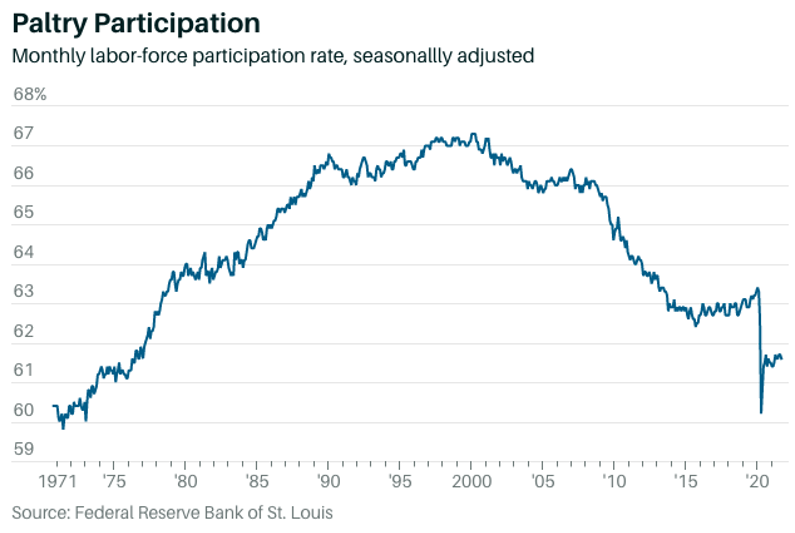 |
| Source: Barron’s |
Two friends of mine own restaurants and cannot find enough employees to fully staff their businesses … despite now offering a starting wage of $15 an hour.
“I’ve washed more dishes in the last month than I have in the last 20 years,” complained my friend. “Nobody wants to wash dishes for $15 an hour.”
• Cost-of-living increases have played a significant role in all of this.
For years, wages failed to keep apace of increases in everything from housing and cars to food and health care.
And while productivity has skyrocketed, wages have stagnated:
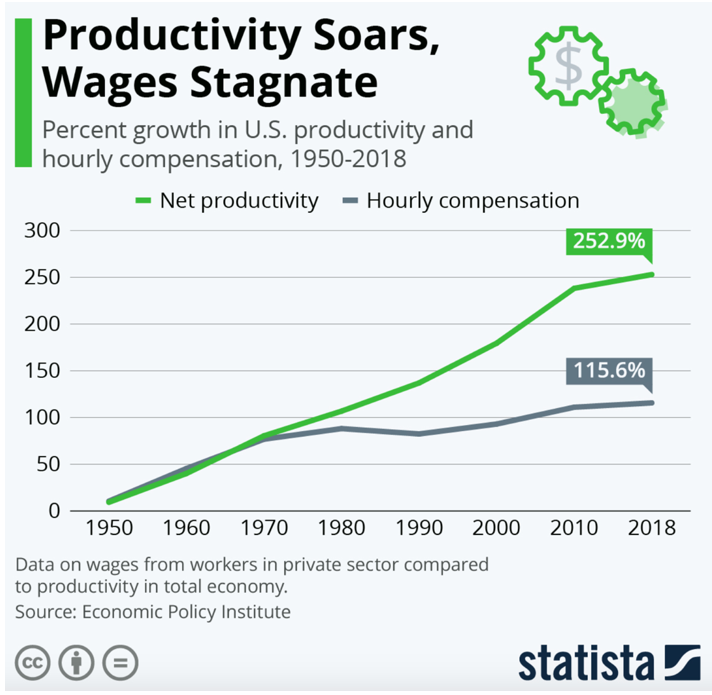 |
Another important part: the U.S. labor shortage. The number of available workers is down 4.9 million since the start of the COVID-19 pandemic.
• That’s a big problem for businesses.
Congress keeps passing trillion-dollar bills our country cannot afford. And the Federal Reserve is waiting for those millions on unemployed Americans to return to the workforce before raising interest rates and scaling back its $120 billion monthly bond purchases.
All that printed money is fueling inflation that’s pushing the price of nearly everything higher: gasoline, used cars, dining out, rent and beef.
• Want to see that inflation in action?
Go to the meat section of your local Costco and watch the sticker-shock reaction of shoppers who pick up a package of beef, see the sky-high price and put the package down.
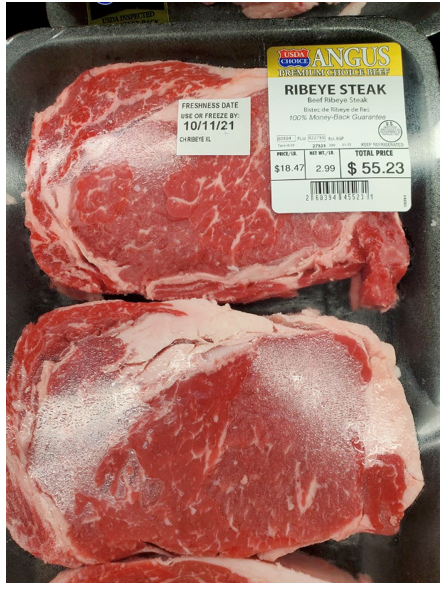 |
3 Real Winners When the Minimum Wage Goes Up
The newly minted Nobel Laureates aren’t the only winners in the minimum-wage debate.
Investors can make a lot of money in the stock market for the next few years in three key ways as wages and inflation rise:
• Don’t own long-term bonds. The yield on the 10-year Treasury bond is over 1.5% and headed higher.
• Increase your exposure to hard assets like energy, industrial metals and gold.
• Pay attention to money flows. The growth baton is being passed from service stocks to production stocks.
In the old days, the most profitable companies were the ones making things: appliances, machinery, automobiles, food, construction products, furniture, etc.
These days, companies that produce nothing material — Alphabet's (Nasdaq: GOOGL) YouTube, TikTok, Spotify (SPOT), Facebook (FB), Etsy (ETSY), Shopify (SHOP), etc. — are making billions from clicks and sales on the internet.
However, that’s changing in front of our eyes.
I’m not saying you need to dump tech stocks. Many like Apple (AAPL), Cisco (CSCO) and Microsoft (MSFT) are building valuable products.
These stable companies also pay stable dividends to their shareholders … and should do so for a long time to come. You don’t have to miss out on those.
• What you should also do is go back to the basics of “makers” and “takers.”
The makers produce the things we can’t live without … and the takers deliver them to the brick-and-mortar stores where we shop.
If you want to know how to best identify these companies, sign up for my futurist investing newsletter, Disruptors & Dominators. My readers own a healthy mix of well-established companies with lots of cash flow along with select names that I believe will be among the next generation of leaders.
The minimum wage will always be up for debate. What won’t be is that rising wages will continue fueling rising inflation. It’s my job to help you ramp up your profits even more, and it’s a role I take very seriously. And the only prize I care about winning is having happy customers. Join them here.
Best wishes,
Tony

